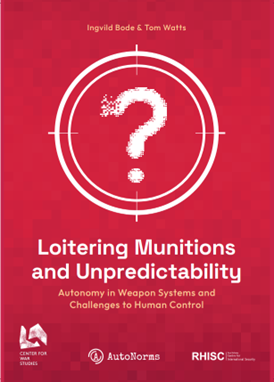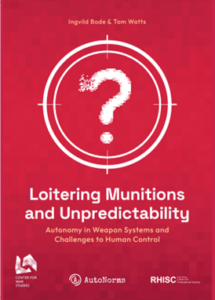Research Themes
Human-Machine Interaction
The extent to which humans remain in direct control of the use of force and the quality of that control are key themes animating the international debate on autonomous weapons systems. This research theme examines these concerns in the context of practices of human-machine interaction and how they shape emerging use of force norms, including an emerging norm of “meaningful” human control.
Articles on human-machine interaction

Five Questions We Often Get Asked About AI in Weapon Systems and Our Answers
By Anna Nadibaidze and Ingvild Bode The ongoing integration of artificial intelligence (AI) and autonomous technologies in weapon systems raises many questions across a variety of fields, including ethics, law, philosophy, and international security. As part of the AutoNorms project, we have contributed to many of these discussions over the

Loitering Munitions and Unpredictability: Autonomy in Weapon Systems and Challenges to Human Control
Download the report here By Ingvild Bode and Tom Watts A new report published by the Center for War Studies, University of Southern Denmark and the Royal Holloway Centre for International Security highlights the immediate need to regulate autonomous weapon systems, or ‘killer robots’ as they are colloquially called. Written by

A Question of Trust? New US Initiatives to Tackle the Human Control Problem
A lack of or a substantially diminished quality of human control is often understood as the major problem associated with military AI. The US Department of Defense (DoD) ‘Directive 3000.09’ that was released in 2012 as one of the first political documents on autonomy in weapon systems, for example, states

AutoNorms
An international research project examining weaponised artificial intelligence, norms, and order
Brows Research Themes
Recent Articles

Submission to the United Nations on AI DSS in the Military Domain

Google’s Brave New World? Big Tech, Military AI, and the Trump Effect
Weapons Systems Data

Loitering Munitions Report Online Launch Event

